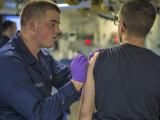Apr 1, 2003 (CIDRAP News) – Federal agencies have reported four more cases of heart inflammation in military personnel who received smallpox shots, including one severe case. The report came as officials advised the states to suspend smallpox shots for people with three or more major cardiac risk factors as well as for those with known heart disease.
Fourteen military vaccinees have had myocarditis, pericarditis, or both, an increase of four cases over the 10 mentioned last week, according to the Department of Defense (DoD) Web site on smallpox vaccine safety. The Centers for Disease Control and Prevention (CDC), in a report on its Web site, said that one of the military patients "became severely ill with heart failure" Mar 27 and remained hospitalized yesterday. It gave no other details.
The DoD safety summary, updated yesterday, said that all the myocarditis and pericarditis patients had recovered. DoD officials could not be reached for clarification of the patient's status in time for this writing. All the heart inflammation patients were said to be first-time vaccinees.
Three people, including two civilians and one National Guard soldier, recently died of myocardial infarctions (MIs) within days or weeks after receiving a smallpox shot. Three other civilian vaccinees have had an MI or angina, and two civilians have recovered from cases of myopericarditis, according to the CDC. Four of the five civilians who experienced MI or angina, including the two who died, had preexisting risk factors for coronary artery disease, according to CDC.
In response to the reports, the CDC on Mar 25 advised the states to suspend smallpox vaccinations for people with known heart disease. Yesterday the agency broadened that recommendation to include people with three or more major cardiac risk factors. The risk factors include hypertension, diabetes, high blood cholesterol, current smoking, and having a close relative with heart disease before the age of 50. In modifying its recommendation, the CDC acted on the advice of the Advisory Committee on Immunization Practices (ACIP).
Yesterday, CDC announced it had "informed the states that the agency has accepted the ACIP's recommendations and that the vaccination program will continue. CDC has distributed revised pre-vaccination clinic education materials which reflect the new exclusion criteria."
The vaccination suspension for the groups mentioned is temporary while CDC tries to determine whether the heart disorders are related to the vaccine. Because of the large numbers of people vaccinated—about 350,000 military members and more than 25,000 civilians—the heart attack and angina cases could be coincidental, according to the CDC. But the number of myocarditis cases in military members is higher than would normally be expected in that population, suggesting a possible link to the vaccine, officials have said. However, no risk factors for myocarditis or pericarditis have been identified.
The CDC is advising people who have received smallpox shots to seek medical attention immediately if they experience chest pain, shortness of breath, or other symptoms of heart disease.
The Associated Press reported today that nine states—Arizona, California, Illinois, Maine, Michigan, Nevada, New York, Vermont, and Washington—have suspended all smallpox vaccinations while the cardiac cases are investigated.
In another setback for the struggling civilian vaccination program, the House of Representatives yesterday defeated a Republican proposal for compensating health workers who are harmed by the vaccine. The lack of a national compensation program has been seen as the main obstacle to the civilian program, which has recruited only a small fraction of the hoped-for 450,000 healthcare and public health workers.
The Republican compensation plan was rejected on a vote of 206-184, with Democrats arguing that a more generous plan is needed, according to the Associated Press report. Based on a Bush administration proposal, the Republican plan would provide $262,100 for those who die or suffer permanent total disability because of the vaccine. For lesser injuries, the plan would pay up to $50,000 a year to offset lost wages, with a lifetime ceiling of $262,100.The Democrats' plan would pay the same benefit for death or permanent disability, but would provide $75,000 a year for lost wages, with no lifetime cap.
In other developments, the DoD's smallpox safety summary now lists updated figures for several vaccine-related complications. It says that two people received vaccinia immune globulin (VIG) treatment, usually used for severe complications, but does not specify the complications. The report also shows 25 cases of generalized vaccinia, all of them mild; 29 cases of auto-inoculation (inadvertent vaccinia infection), none considered severe; and 10 cases of vaccinia virus transmission to others. None of these 10 were severe, but one patient was hospitalized, the report shows.
See also:
CDC news release
http://www.cdc.gov/media/pressrel/r030331.htm
CDC fact sheet "Smallpox Vaccine and Heart Problems"
http://emergency.cdc.gov/agent/smallpox/vaccination/pdf/cardiacrecentvaccinees.pdf
CDC fact sheet "Smallpox Vaccine and Heart Problems: Information for People Who Have Recently Received the Smallpox Vaccine"
http://www2a.cdc.gov/HAN/ArchiveSys/ViewMsgV.asp?AlertNum=00131




















